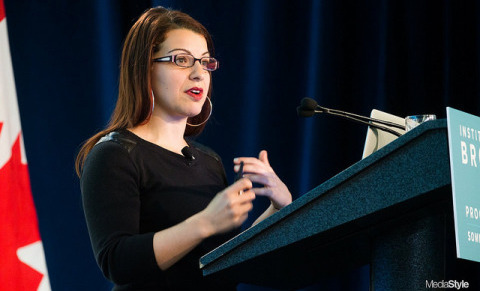Anita Sarkeesian: “Feminist characters should challenge gender roles”

(Broadbentinst/Flickr)
On Wednesday, Nov. 3, media critic and Feminist Frequency creator Anita Sarkeesian visited the University of Massachusetts Amherst to talk about her research regarding the portrayal of female characters in video games and the media.
The lecture, titled, “I’ll Make a Man Out of You: Redefining Strong Female Characters,” was part of the university’s year-long series, “Social Science Matters: Perspectives on Resistance.”
For three years Sarkeesian has been the target of online threats, most recently from #GamerGate, a group of people determined to preserve the male-dominated gamer culture who disagree with her Tropes vs. Women YouTube series. And yet she still fights against female stereotypes, misrepresentations and gender binaries.
The Department of Communications chair, Erica Scharrer, introduced Sarkeesian and explained that when the board was picking guest speakers for the series, Sarkeesian was an obvious choice.
Sarkeesian took the podium, sporting a dark leather jacket and gold hoop earrings. She looked at the crowded ballroom and began.
“As viewers,” she said, “we are starved for representations of valuable women.”
She said that she began playing video games at just five years old. In graduate school, she devoted her research to the portrayal of women in science fiction. After realizing that feminism was underrepresented in the media, Sarkeesian founded Feminist Frequency.
Throughout the lecture, Sarkeesian showed pictures of female characters from video games, movies and television shows, explaining how each of them either perpetuated or fought stereotypes and tropes.
“The ‘damsel in distress’ trope disempowers female characters and robs them of their chance to be heroes in their own light,” she said.
She turned to the screen behind her and played a short clip featuring Krystal, a character from the “Star Fox” video games. Krystal was originally written to be the protagonist of the game, but was soon replaced by a male character and demoted to the damsel he must rescue.
This “damsel in distress” trope is not a simple fix; we can’t simply apply traits valued in strong male characters to females. The critic suggested that video games should “cut down on the boring clichés by providing more original and interesting narratives.”
According to Sarkeesian, “mainstream pop culture interprets feminism to mean women can drive fast cars and kill people, too…we need to reimagine concepts of gender power and move beyond the glorification of violence,” she said.
Sarkeesian explained that when stereotypical male traits, like aggressiveness, competitiveness and unemotional, are applied to female characters, the women are viewed as “wild” and “out of control,” pointing to a scene from “Battlestar Galactica,” in which a female character, Starbuck, gambles and punches a man after being attacked.
However, not all female characters are portrayed badly in the media. Sarkeesian praised Buffy from “Buffy the Vampire Slayer” and Captain Kathryn Janeway from “Star Trek: Voyager.”
Captain Janeway, she said, “was not the female captain; she was the captain.”
Sarkeesian also discussed Imperator Furiosa from “Mad Max: Fury Road.” Many feminists believed Furiosa to be empowering, but Sarkeesian disagrees. She said that Furiosa is a character that seems powerful and confident but actually lacks character development. Looking at Furiosa with a “feminist lens,” Sarkeesian explained, she was unable to view her as a strong female character.
She filled the screen behind her with words that epitomize values for a feminist vision, like “resilient, humble, compassionate, and cooperative.” She said that these traits should be free from gender stereotypes and instead be recognized as universal human traits.
Victoria Lucarelli, a Mount Holyoke junior and president of the video game club AutoSave, was happy to see Sarkeesian speak.
“It is wonderful to see somebody so out in the open…as part of pop culture discussion,” said Lucarelli. She said that she was impressed by Sarkeesian’s analysis of male traits in relation to female characters.
“There’s always been an underlying question of feminism in video gaming,” she said, “but Anita came out at the right time to talk about it.”
After her last remarks, Sarkeesian answered questions from the audience. One person asked how she continues her work amidst such serious threats and controversy online.
“It never occurred to me to stop,” Sarkeesian said. “This work is really valuable and really important.”
Sarkeesian explained that #GamerGate has been “tragic” for women in the tech world because it discourages many from getting involved. “We have to have more women in these fields if anything is going to change,” she said.
Hampshire College graduate Olivia Vasquez said that she has been following Sarkeesian’s work for a while now, even before the “Tropes vs. Women” videos.
“Nothing about it was very new if you’ve been following her stuff, but I think what she had to say about valuing masculine traits over feminine traits was useful and a good way to think about ways in which we value characters,” said Vasquez.
Sarkeesian said that she believes there is more work to be done with women in the media, especially video games.
“I think that video games still have a really long way to go to have decent representations of women,” Sarkeesian said. “We have to reimagine what power looks like outside the patriarch and redefine it for the benefit of all people.”
Email Stephanie Murray at [email protected], or follow her on Twitter @stephmurr_jour.

"Never give up, for that is just the place and time that the tide will turn."
[email protected]





